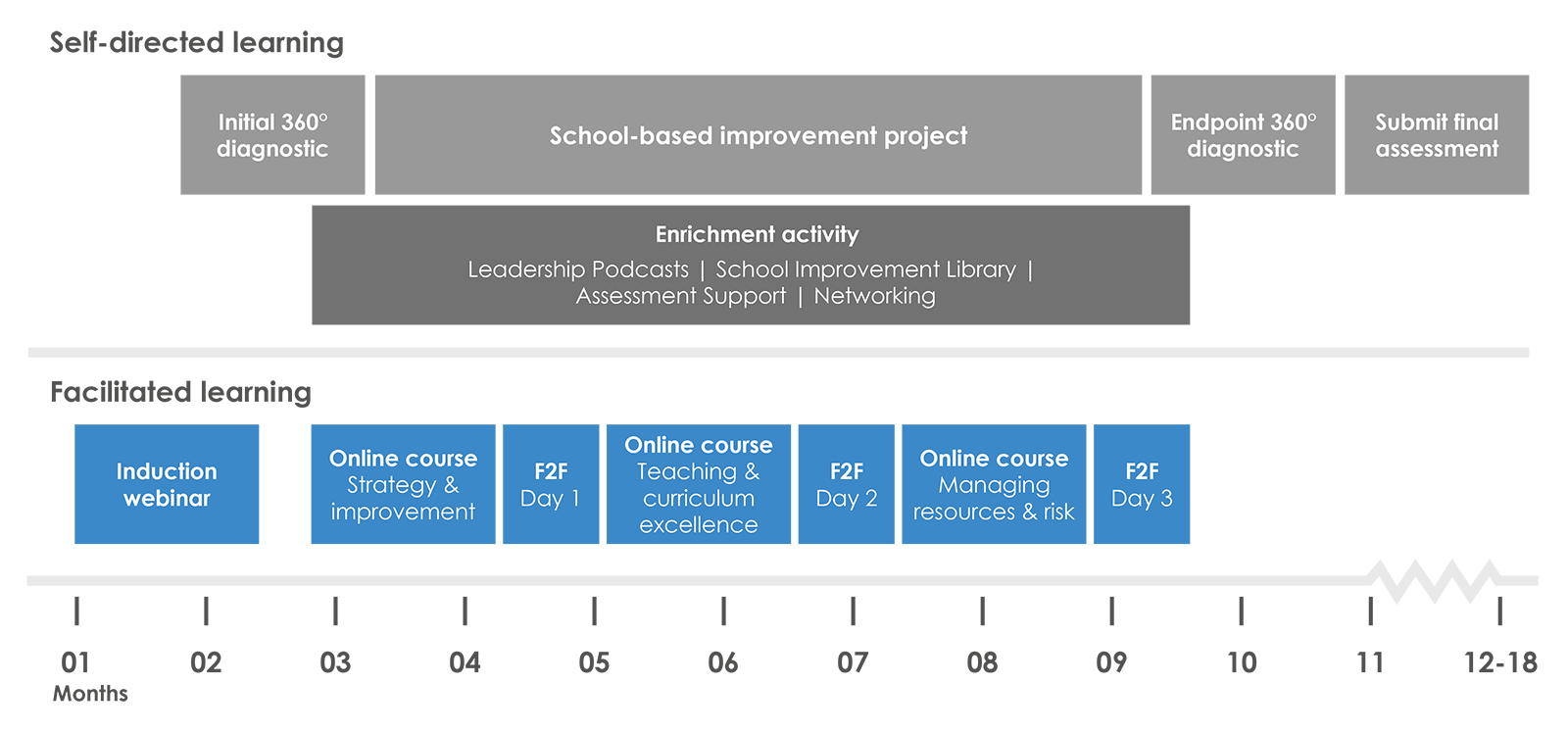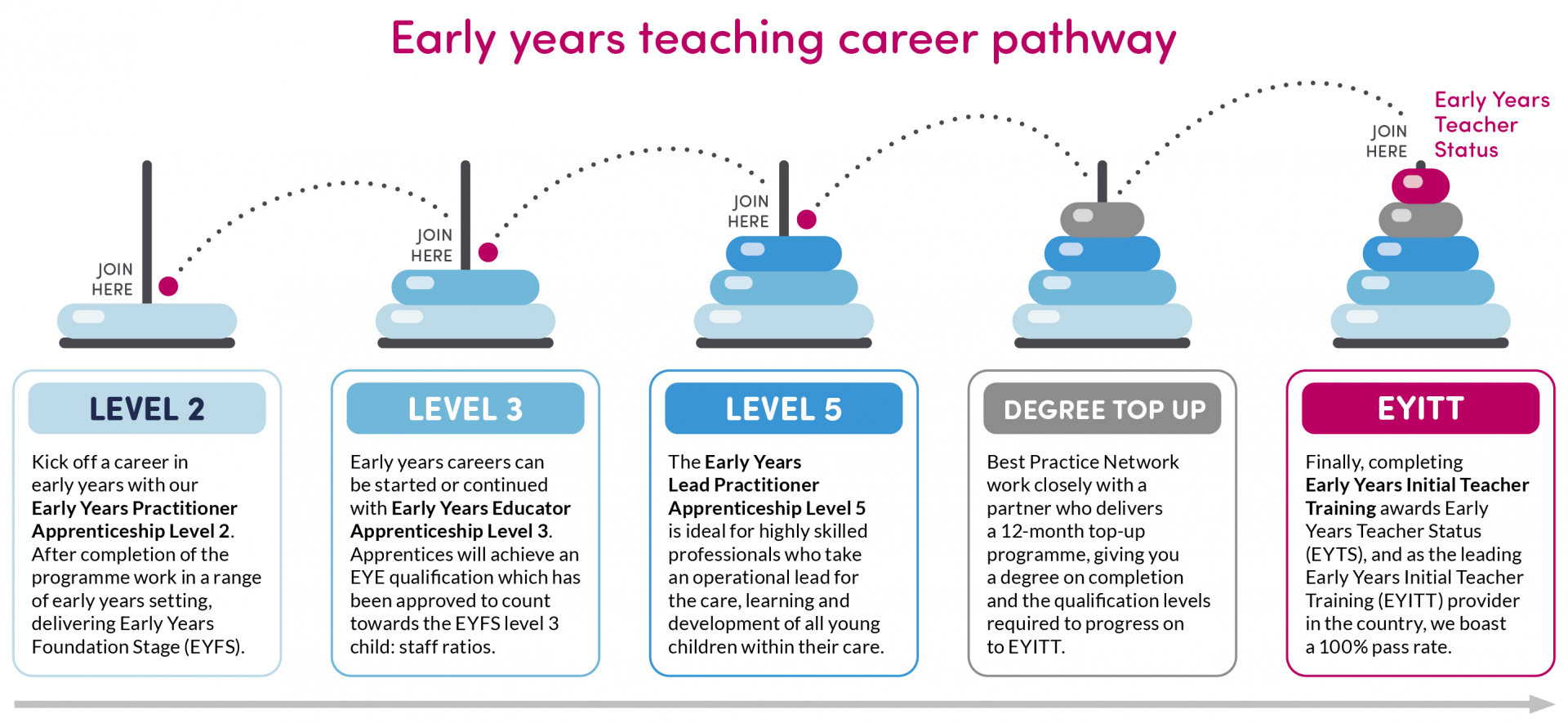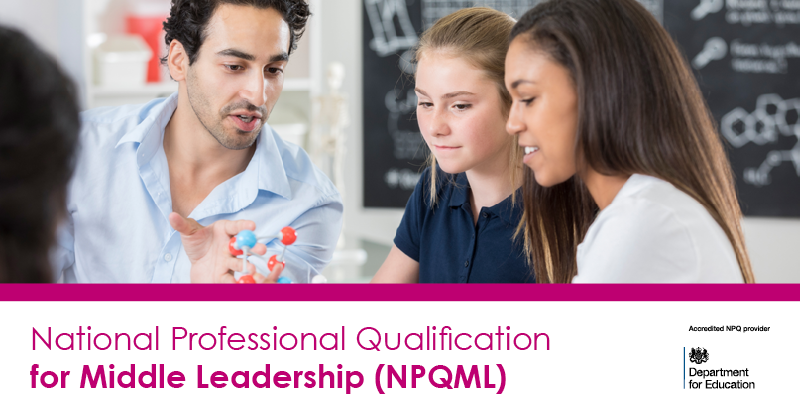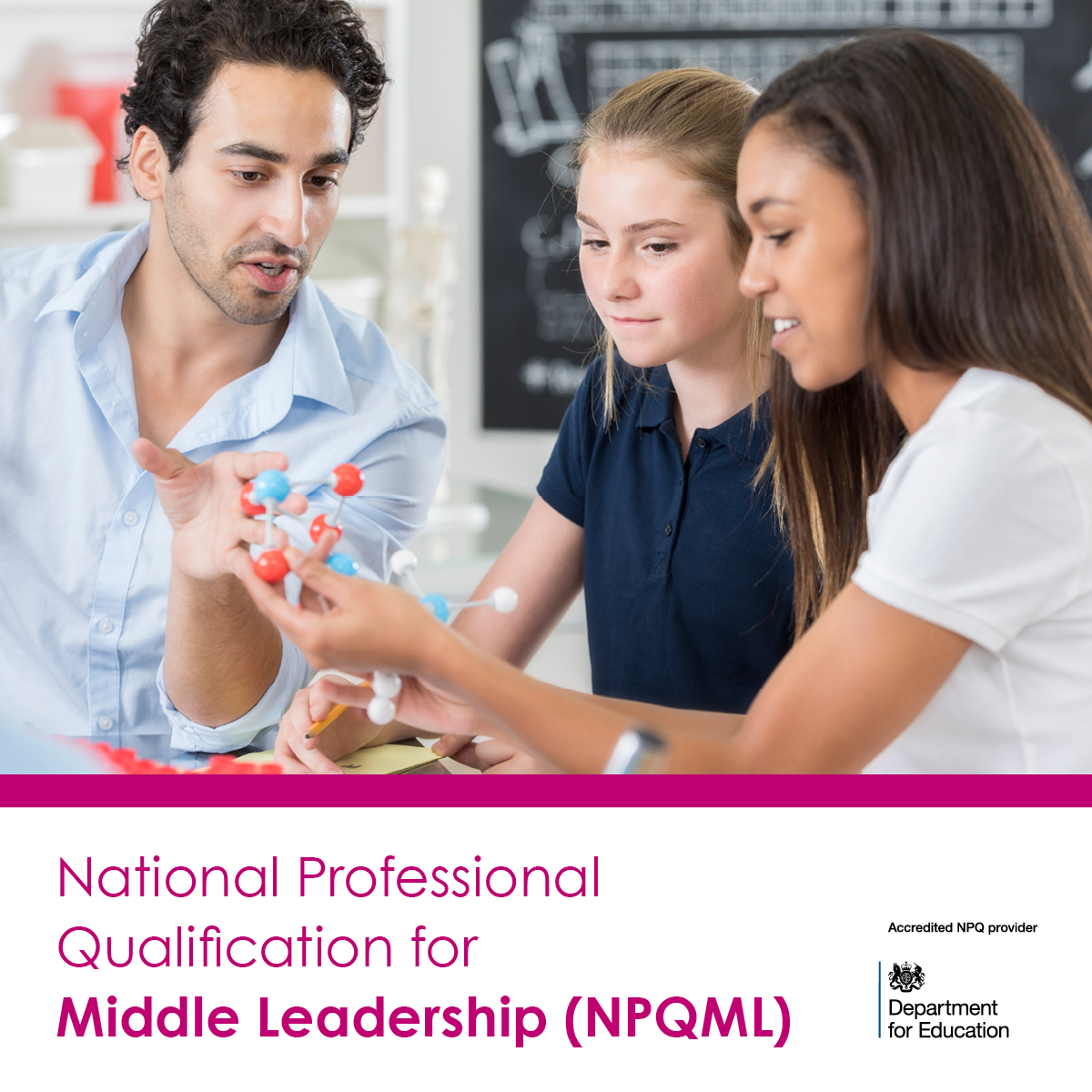National Professional Qualification
for Middle Leadership
The NPQML programme has now been discontinued by the Department for Education and has been replaced by three specialist NPQs. Please visit our NPQ page for more information about the currently available NPQs
The National Professional Qualification for Middle Leadership (NPQML) provides recognition of leadership development and professional achievement for middle leaders.
The qualification covers 6 content areas which set out what a leader should know or should be able to do and 7 leadership behaviours which set out how the best leaders operate. The content areas have been embedded within 3 online courses, with the leadership behaviours explored during the face-to-face events.
Due to social distancing guidelines, NPQ face-to-face events are currently being delivered online through facilitated online workshops, extra tutor support and study packs, find out more.
Although face-to-face events are currently suspended until a review in the summer, candidates will still be grouped according to either their location or the delivery partner they signed up with.
NPQML is recognised as a contribution towards entry onto a full Masters programme. Find out more about the credit exemptions available here.
Who is this for?
NPQML is suitable for middle leaders with responsibility for a team including Key Stage leaders, subject leaders, and curriculum leaders, and also heads of department or pastoral leaders.
You can view our programme metrics here.
What are the benefits?
- Facilitation and support from serving school leaders in outstanding schools
- Purpose-built virtual learning environment enabled for mobiles and tablets
- Delivery at local venues
- Guaranteed support to pass the final assessment
- Content contextualised for your locality and updated to reflect national developments and legislation
- Regular progress updates for mentors and headteachers
Programme outline
Qualification Schedule

Qualification Content
The qualification covers 6 content areas which set out what a leader should know or should be able to do and 7 leadership behaviours which set out how the best leaders operate. The content areas have been embedded within 3 online courses, with the leadership behaviours explored during the face-to-face events.
Event Content
Each day is facilitated by experienced serving school leaders.
| Event 1: Strategy & Improvement |
• The qualification framework and assessment criteria • Outcomes of the 360° diagnostic • School improvement project planning • Analysing school data and identifying strategies for improvement • Effective leadership of change strategies |
| Event 2: Teaching & Curriculum Excellence |
• Reflections on Teaching & Curriculum Excellence • Applying learning to PISA data 2015 • Considering Prof Robert Coe’s questions about school improvement with impact • A US Navy model of leadership • Strategies for managing your own well-being |
| Event 3: Managing Resources & Risk |
• Assessing individual performance and capability • Establishing relationships and structures and/or processes to mitigate barriers • Analysing the financial and staffing implications of plans • Evaluating the impact and cost-effectiveness of professional development in terms of pupil outcomes |
Online Course Content
| Strategy & Improvement | Teaching & Curriculum Excellence | Managing Resources & Risk | |
| Module 1 | Context for change & strategic development | Context for change - teaching & learning reality | Financial efficiency & effectiveness |
| Module 2 | Creating the vision & strategic improvement environment | Creating the learning culture for effective teaching and learning and curriculum opportunity | Accountability & Governance School-led partnership and impact |
| Module 3 | Establishing credible relationships & effective collaboration | Growing talent and quality momentum | Staffing recruitment, retention and performance |
| Module 4 | Transforming the culture for improvement & impact | Transforming lives and opportunities for improvement and impact | Transforming schools through school-led partnership and impact |
Guideline Study Hours Breakdown
| Component | NPQML |
|---|---|
| 360 leadership diagnostic | 2 |
| Face-to-face events | 18 |
| Online courses | 60 |
| Online briefings | 4 |
| Performance coaching | N/A |
| Exec/Head-led webinars | N/A |
| Peer challenge groups | N/A |
| TOTAL | 84 |
Assessment
Leading an improvement project (4,500 words)
Candidates must lead an improvement project within their team, lasting at least two-terms, to a) improve pupil progress and attainment b) the capability of their team. A written account of the project covering the design, implementation and evaluation must then be submitted for assessment.
Project scripts and supporting evidence are assessed in accordance with a mark scheme provided by the DfE and are subject to national moderation.
In order to achieve NPQML candidates must:
- complete 3 online courses and associated core tasks
- engage with practice-based events
- pass final assessment within 15 months of starting the qualification
NPQML Spring 2021 event dates and online course facilitation windows
| Engagement window | Programme element |
|---|---|
| Today – 12/02/2021 |
NPQ Course Preparation and Welcome Pack Release (Official start of Engagement with Preparation Activities) |
| 08/02/2021 – 12/02/2021 |
Canvas Welcome Message and Login Details Release [Start of Induction Stage] |
| 01/03/2021 – 26/03/2021 |
Strategy and Improvement (S&I) Online Course Facilitation Window (20 hours engagement over 4 weeks) [Start of Development Stage] |
| 26/04/2021 – 07/05/2021 |
NPQML Face-to-face Event 1 (or Distance Learner Equivalent Activity) |
| 07/06/2021 – 02/07/2021 |
Teaching and Curriculum Excellence (T&CE) Online Course Facilitation Window |
| 05/07/2021 - 16/07/2021 |
NPQML Face-to-face Event 2 (or Distance Learner Equivalent Activity) |
| 22/09/2021 – 15/10/2021 |
Managing Resources and Risks (MR&R) Online Course Facilitation Window (20 hours engagement over 4 weeks) |
| 06/09/2021 – 17/09/2021 |
NPQML Face-to-face Event 3 (or Distance Learner Equivalent Activity) [Start of Final Assessment Stage] |
How is it delivered?
Candidates will usually complete the qualification within 12-18 months and benefit from our following learning models:
Our blended learning model

- three face-to-face training events
- three guided online courses working alongside peers
- regular online conferences to support and complement learning
- access to two 360° leadership skills diagnostics
- support from a nominated in-school mentor
- facilitation from serving school leaders in outstanding schools
- local and flexible access to high-quality leadership training
- dedicated online tutor to support school improvement project planning
- mobile-enabled virtual learning environment enabling flexible access to course resources and support community
- option to accrue 40 credits to contribute towards an MA in Educational Leadership with Chester University
The Online Elements of NPQML:
What does it cost?
| School Type | Fee payable |
|---|---|
| All state-maintained schools, academies and independent schools in the UK |
£1,050 |
| International schools |
Click here |
How to apply
NPQ applications for Spring 2021 are now closed. If you'd like to express an interest in joining our Autumn 2021 intake, please click the 'Express Interest' button in the right-hand column and complete the short form.
You will be asked to upload the following as part of your registration:
- A signed declaration from your headteacher in which they agree to support you through the programme and confirm that the school will finance the cost of the course.
It will save time if you have this before you start your online registration.
DfE Scholarship Funding
Candidates from schools that sit within a Category 5 or Category 6 area are eligible for fully funded DfE scholarships. Candidates from schools within MATs or dioceses where at least one school sits within a Category 5 or Category 6 area are also eligible. Contact us with the name and address of your school and we will be glad to look up the Category of your school.
The DfE has put no limit on how many scholarships can be claimed per school. However, we encourage schools to ensure they have sufficient capacity to provide each colleague with a school-based mentor, a suitable school improvement project they could individually lead on, and ensure they have the capacity to support colleagues being out of school for the face-to-face events.
If you are eligible for a scholarship simply enter "Fully funded by scholarship/government funding"in the invoicing section of the application portal (as per the below image). Our back-office team will then apply to the DfE for your scholarship. In this instance, the rest of this section can be left blank.
No. If you work in a school which is in a Category 5 or Category 6 area neither you nor your school will be invoiced. Once your application has been accepted we will immediately apply to the DfE for the scholarship.
DfE funding for the National Professional Qualifications is available to leaders or aspiring leaders in schools located in Category 5 and Category 6 areas. These are areas with persistent underperformance, where not enough children have access to a high-quality school place and where there is insufficient capacity to drive improvement.
This is part of an ongoing initiative by the DfE to strive for excellence in deprived areas of England. You can find out more information about how these areas were determined in this DfE publication.
Groups & Locations
We will always endeavour to let you know of your group arrangements and course schedule no longer than 2 weeks after the recruitment window has closed. However, if recruitment demands are high and/or the application window is extended (which you’d be made aware of), the date of this course arrangements’ announcement is subject to change.
Candidates who feel their group allocations are not sufficiently convenient are free to change group or withdraw from the course at no expense to themselves. We also have a distance learning model that allows candidates to complete the qualifications by attending webinars and taking part in online discussions instead of the face-to-face events (see Distance Learning Model below).
Distance Learning Model
The Distance Learning Groups engage with additional online activities and briefings in lieu of attending face-to-face events. Overseas candidates are grouped according to time zones to meet each learner’s scheduling needs. The online replication of each training event involves:
- 1 hour online briefing covering the key learning and introducing the supporting activities
- 2 weeks of online activity - Completing a selection of activities covering key themes and ideas of the face-to-face events
The web conferences and online discussion activities will typically fall 1 or 2 weeks after each training event has been held. As such, you will virtually be on the same schedule to complete the course.
Your time-frames for final assessment would remain unchanged at 18 months and you would still be expected to engage with, and complete, the three essential online courses alongside other candidates.
Eligibility Requirements
NPQML & NPQSL: You will need support from, and access to, a school setting, as a key requirement to be offered a place in the qualification. Furthermore, as part of your NPQML/SL qualification, you are required to work closely with an in-school mentor. Your mentor will be critical in providing support, advice and feedback as you work on your school improvement project. All candidate applications must be supported through the completion of a Headteacher Declaration, this declaration must be signed by your Headteacher and confirms that they support your place on the training and will provide the necessary time and support needed to successfully complete the qualification.
NPQH & NPQEL: You will need to be supported by a sponsor who will be closely involved in supporting your application to join the qualification, your subsequent development and in the final assessment process. This should be someone with a detailed and thorough professional knowledge of your work and professional characteristics as well as the demands of headship, the associated leadership behaviours and the requirements of the content areas. For example, your existing Headteacher (NPQH), Executive Head, School Improvement Partner, or the Chair of your accounting body.
Delivery
We at the Outstanding Leaders Partnership pride ourselves on the support we offer our candidates. For the entirety of your leadership journey you will be supported by the following members of the team:
| Title | Purpose of role |
|---|---|
| Facilitator | To facilitate face-to-face training events, which consolidate the learning undertaken online and during in-school activity. |
| Online Tutor | To support you through your online learning experience; ensuring you are active and engaged in the programme. |
| Coach (NPQH and EL) | To provide expert coaching to participants throughout their qualification. |
| Mentor | To provide support, guidance as well as challenge you, ensuring you have the capacity to complete your qualification. |
| Assessor | Undertake an assessment of the final written submission and supporting evidence. |
| Candidate and Partner Support (CAPS) Team | All logistical support queries (events, resources, groups, dates etc.) should be directed to the Candidate and Partner Support (CAPS) Team at Best Practice Network (cpd@bestpracticenet.co.uk). |
Our NPQs are delivered through a blended learning model consisting of a combination of face-to-face events, online courses & briefings and, for NPQH and NPQEL candidates, individual performance coaching. A detailed breakdown of the guided learning hours candidates can expect can be found in our soon to be published qualification specifications, but overall candidates will receive the following:
| Qualification | Guided learning hours |
|---|---|
| NPQML | 92 |
| NPQSL | 92 |
| NPQH | 112 |
| NPQEL | 132 |
Certificate
An NPQ certificate branded by the DfE*
*if you do not have a valid TRN you will still receive an NPQ certificate but not branded by the DfE.
Level 3 Early Years Educator (EYE) Apprenticeship
As part of our Early Years initiative, learners who wish to become early years professionals, or those already working in this area of education, can take part in our programmes and advance onto other qualifications related to early years and child care. This initiative supports you in achieving your own ambitions and allows you to gain the skills required to support the next generation in being able to reach theirs.
Our Early Years Career Pathway has been developed to support your career development, take into account the variety of roles within the early years sector, and help you develop your career.
This pathway includes the following programmes: Early Years Practitioner (EYP) Apprenticeship Level 2, Early Years Educator (EYE) Apprenticeship Level 3, Early Years Lead Practitioner (EYLP) Level 5 and Early Years Initial Teacher Training (EYITT) (eligible with a degree top-up).

Early Years Lead Practitioner Level 5
As part of our Early Years initiative, learners who wish to become early years professionals, or those already working in this area of education, can take part in our programmes and advance onto other qualifications related to early years and child care. This initiative supports you in achieving your own ambitions and allows you to gain the skills required to support the next generation in being able to reach theirs.
Our Early Years Career Pathway has been developed to support your career development, take into account the variety of roles within the early years sector, and help you develop your career.
This pathway includes the following programmes: Early Years Practitioner (EYP) Apprenticeship Level 2, Early Years Educator (EYE) Apprenticeship Level 3, Early Years Lead Practitioner (EYLP) Level 5 and Early Years Initial Teacher Status (EYIIT) (eligible with a degree top-up).
 How do I move forward in my Early Years Career?
How do I move forward in my Early Years Career?









